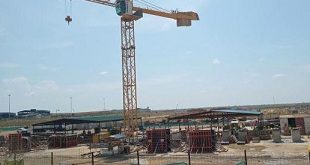
Kampala, Uganda | XINHUA | Trailing his hands over their soft green tips, Ziad Thabet looks with pride at the vegetables he planted on his rooftop as part of his efforts to achieve self-sufficiency amid soaring prices in the markets.
Like most Syrians, the retired man has felt the economic hardships the country is going through, which affected the livelihoods of Syrians, particularly with the new sanctions imposed on the country by the United States.
Thabet, who lives in the city of Sweida in southern Syria, didn’t succumb under the pressure of the economic crisis that has been exacerbating since last year. Instead, he came up with the idea of using his rooftop to plant vegetables that he needs instead of buying them from the market.
He chose styrofoam boxes and planted seeds of various vegetables and fruits in the boxes such as tomato, cucumber, eggplants, watermelon, among others.
“The salary of retirees is limited and given the crisis and the economic hardship, we needed to search for new means to feed ourselves and our children. I started planting the roof here to achieve self-sufficiency in addition to my pension,” he said.
It’s been a year since Thabet started planting the roof of his apartment building and now what he is planting is enough for his needs.
“Planting has become a necessity these days in any country; it’s called self-sufficiency or food security. Whoever eats from his effort and his land will never need anyone else,” he said.
After making use of the empty space on the roof, Thabet eyed a small arid land near his house and decided to clean it from the broken glass and rocks.
Now, the green vegetables fill that space which has become pleasing after remaining eyesore for many years.
Thabet maintains positive energy while he moves among his plants and checks them with hands. He told Xinhua that he encouraged his neighbors to follow his lead and do the same in their empty spaces, noting that the project doesn’t cost a lot of money.
People can learn anything these days from the internet, particularly the planting projects, he said.
The energetic man said his neighbors have encouraged him and got impressed by what he did as some of them in nearby buildings started copying the project with his help and advice.
To the south of Sweida, in the village of Bakka, Raslan Othman, a contractor, has planted a stretch of land that belongs to his home with various vegetables and fruits.
The man, in his 30s, has found the best way to cope with the economic situation as to rely on his planting experience to achieve self-sufficiency for his family.
Othman lives near his brother and the rest of the family members, which makes them all partners in this project.
“Over the past two years, we started to feel that the money we were making is not enough for us as a family in this house, so farming was a very good option that saved us from paying extra money,” he told Xinhua.
Othman was once a farmer but worked as a contractor later. However, as the economic situation started worsening during the more than nine-year long war, his priority has shifted and now he is giving his time to farming the land near his home and another one his family owns in the village.
“Amid the current economic crisis, my priorities have changed from being a contractor to being a farmer and this has encouraged me to focus more on farming to achieve self-sufficiency for us,” he said, adding that his plants are sufficing him and his extended family as well as his neighbors.
****
XINHUA
 The Independent Uganda: You get the Truth we Pay the Price
The Independent Uganda: You get the Truth we Pay the Price



